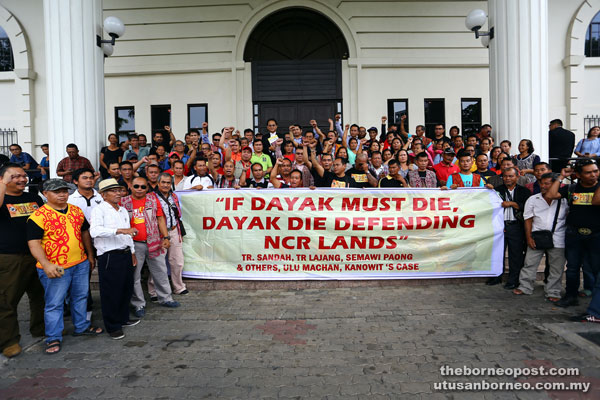
Baru (in suit, at back row) with supporters at the Kuching Courthouse. — Photo by Muhammad Rais Sanusi
KUCHING: The Federal Court has ruled that the native custom of ‘pemakai menoa’ (territorial domain) and ‘pulau galau’ (communal forest reserve) has no force of law in Sarawak.
In a three-to-one decision, the apex court allowed the appeal by the state government and set aside the orders of the Court of Appeal and High Court that recognised native customary rights (NCR) over ‘pemakai menoa’ and ‘pulau galau’.
The respondents in the case were Tuai Rumah Sandah Tabau of Rumah Sandah in Ulu Machan, Kanowit and eight other NCR landowners. They claimed that they had customary rights over 2,712 hectares of ‘pemakai menoa’.
Court of Appeal president Tan Sri Md Raus Shariff who led the three-member panel hearing the appeal explained that although the common law recognised the unregistered native customs, the state statutes and orders or proclamation made by the Rajahs and subsequently by the legislature of Sarawak did not appear to have recognised the custom or ‘adat’ of ‘pemakai menoa’ and ‘pulau galau’.
“We find that the description of custom that is recognised and determined by the Federal Court in Madeli Salleh’s case corresponds with native custom known as ‘temuda’. The custom of temuda refers to custom of felling or clearing jungles and cultivating claimed area created rights over land.
“This custom has been mentioned and recognised by statute and orders of proclamation made by Rajahs and subsequently by the legislature of Sarawak namely the Rajah’s Order 1875, Fruit Tree Order 1899, Land Order 1952, Land Settlement Ordinance 1953, Secretariat Circular 1939, Tusun Tunggu and Section 5(2) of the Land Code,” the judges said in a written judgement read by the deputy registrar of the Federal Court at the Courthouse here yesterday.
Besides Raus, other members of the panel were Federal Court judges Tan Sri Ahmad Maarop and Tan Sri Abu Samah Nordin. Another Federal Court judge Tan Sri Zainun Ali dissented.
In stressing that recognition of the existence of such custom and practice alone was not enough, the judges said it was important for any custom to have the force of law as defined under Article 160(2) of the Federal Constitution.
They said there were customs which the laws of Sarawak did not recognise and hence did not form part of the customary laws of the natives in Sarawak and would remain merely as practices for the usages of the natives.
“What is essential that is recognised by our courts is the custom of ‘temuda’ which is the cultivation of land for occupation. This custom is essential and integral in the Iban culture which will include the custom of clearing, occupying and cultivating an area and included burial ground and longhouse sites.”
Abu Samah, in his supplementary judgment, said the native community could not stake their claim solely on mere assumption that the custom of pulau galau was part of NCR without offering evidence that they had exercised their rights by using the areas of the disputed land for food or forest produce, fishing or hunting.
Meanwhile, Zainun said the pre-existence rights under native laws which the common law respected includes the right to land in virgin or primary forest which the natives preserved as a source of their livelihood.
“The existence of customary practice of pemakai menoa and pulau (galau) is not disputed. The crux of the appellant’s appeal is that such customary practices do not have the force of law. The definition of law under Article 160 of the Federal Constitution includes customs and usages having the force of law. This makes customary law an integral part of the legal system in Malaysia.”
In emphasising that custom was the source of unwritten laws, she said in general for a custom to be conferred legal and enforceable right, it was essential that such a custom be certain, consistent, reasonable and acceptable by the community.
“It cannot be disputed that pemakai menoa or pulau (galau) continue to exist from time immemorial in the community of Iban. Such custom is certain, reasonable and acceptable by the Iban community. Therefore, it must be recognised and upheld by this court.”
